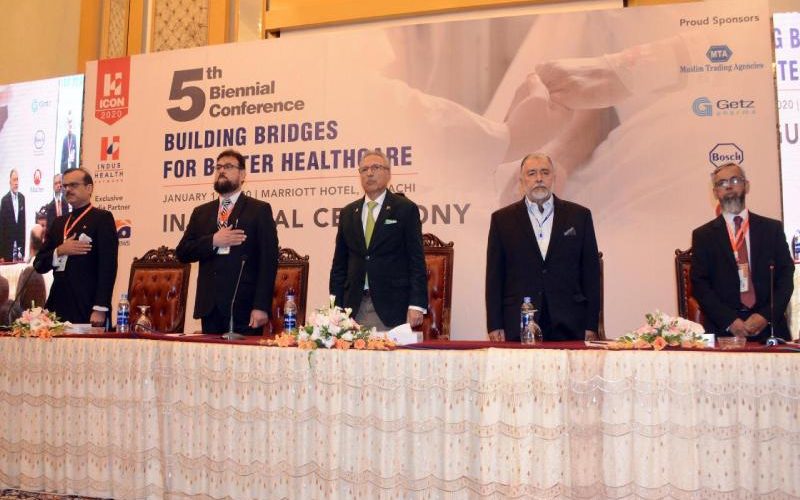PRESIDENT OF PAKISTAN INAUGURATES INDUS HEALTH NETWORK’S ICON 2020 CONFERENCE
Karachi, Pakistan
January 17, 2020
Honorable President of Pakistan, Dr. Arif Alvi inaugurated the Indus Health Network’s (IHN) flagship health conference – ICON 2020 on Friday, January 17, 2020. The inauguration ceremony took place in Marriot Hotel, Karachi. The theme of the current conference is ‘Building Bridges for Better Healthcare’.
Dr. Abdul Bari Khan, Chief Executive Officer, IHN; Younus Hashim Bengali, Chairman IHN; Members of the Board; Dr. Shamvil Ashraf, Executive Director, Medical Services, IHN; Mr. Syed Mashhood Rizvi, Executive Director, Communication and Resource Development Directorate, IHN; and Dr. Mohammad Fareeduddin, Head of Pediatric Services, Indus Hospital and Chair, ICON 2020 and other faculty members were present at the occasion. Dr. Palitha Mahipala, and Dr. Mwelecele Ntuli Malecela, Representatives of WHO participated in the event.
ICON 2020 is aligned with the Government of Pakistan’s commitment towards UN’s Sustainable Development Goal No. 3 of good health and well-being for all. The conference will highlight initiatives taken by the Indus Hospital to address healthcare challenges in Pakistan by bringing together disparate and like-minded institutions and individuals.
The President inaugurated the conference and said, “As a member of this fraternity, the health of the nation is of great importance to me. Ever since I entered the Government, this importance has increased even more! There is a strong link between health conditions of a nation and its productivity.”
He further said, “Public-Private Partnership is our highest priority to lessen the healthcare burden. The Indus Health Network has been a key partner in this process. Indus has been at the fore, bringing technical expertise, technology, and resources to government hospitals and primary care facilities. I want to congratulate Dr. Abdul Bari Khan and his teams for exemplary partnerships with us to benefit our people. They have brought state-of-the-art facilities to cities like Badin. They systemized blood donation and brought it to an international standard in cities in Sindh as well as Multan and Bahawalpur. And they have gone into the most marginalized and furthest communities to screen for TB and other diseases.”
Dr. Mwelecele Ntuli Malecela talked about the importance of collective approach and said, “Integrated approaches enable successful delivery of high-quality healthcare to all, particularly the poorest and those in direst need. Effective collaboration between stakeholders with different missions, interests, cultures, and even vocabularies is difficult to achieve. It requires common understanding as well as collective leadership, a collaborative mindset, and a key partnering skill set. With these critical elements in place, partnerships can achieve real impact.”
In his vote of thanks, Dr. Abdul Bari Khan welcomed all esteemed guests and thanked them. He appreciated the good work Government of Pakistan is doing in the field of healthcare provision. He said, “As an exemplary healthcare and educational institute, IHN is engaged in policy dialogues and research. ICON has been serving as the forum to engage healthcare professionals from different fields and geographical areas. It aims at disseminating research-based recommendations and reflects upon and synthesizing current healthcare scenario along with identifying challenges for future. I hope that ICON 2020 will help us in Building Bridges for Better Healthcare.”
Dr. Shamvil Ashraf briefed about IHN’s initiatives and said, “In order to reach out to more people, to benefit more patients and to build the capacity of public hospitals’ personnel, IHN decided to enter into a partnership with government. It also helped us in replicating our model of healthcare which was free treatment for all.”
Chair, ICON 2020, Dr. Muhammad Fareeduddin said that, “Pakistan was the first country to adopt United Nation’s Sustainable Development Goals 2030 agenda. Indus’ ICON 2020 is committed to contribute to the Goal No. 3 of good health and well-being for all”.
At the end of the conference the management of IHN and ICON’s organizing committee thanked the audience for contributing towards a great cause.
ICON 2020
ICON is a biennial conference and ICON 2020 is fifth of the series. The conference is attended by notable delegates from across the globe. ICON 2020 will have overarching plenary lectures, symposia, workshops, and abstract and poster presentations. The global and multidisciplinary conference will be an excellent networking opportunity for medical and allied health professionals, researchers, government officials, and policy-makers. The ICON 2020 will serve as a great opportunity to share experiences and best practices and to highlight the latest developments in the healthcare sector.
The conference will highlight initiatives taken by the Indus Hospital to address healthcare challenges in Pakistan by bringing together disparate and like-minded institutions and individuals. By addressing core issues, ICON 2020 aspires to pave the way for strategic interventions and innovations. The Indus’ philosophy of national and international collaboration to address the insurmountable health challenges of this region of the world will be showcased.
Indus Health Network (IHN)
In the year 2007, The Indus Hospital (TIH) started as a 150 bed, state-of-the-art, tertiary care facility providing free yet quality treatment to all patients without any discrimination. After widening the scope of work, in 2017, the hospital transformed into the Indus Health Network (IHN). The network is focusing on the development and management of various public and private hospitals throughout Pakistan and is also engaged in establishing a network of primary care clinics and disease-based programs.




